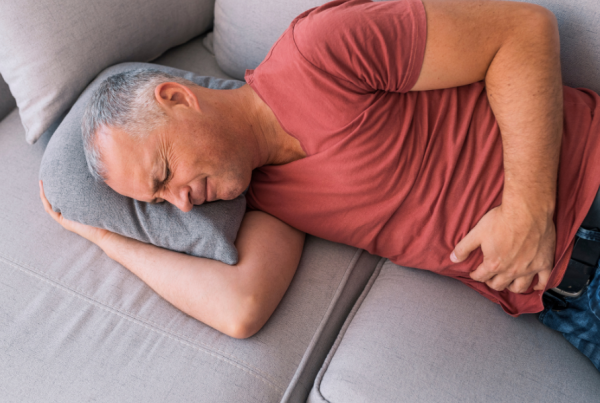Obstructive Defecation
Move Better. Live Fuller. Your Wellness Journey Starts Here.
Schedule a FREE Discovery Call!
What Is Obstructive Defecation?
Obstructive defecation, or obstructed defecation syndrome (ODS), is a condition where bowel movements are difficult to complete.
It can make an individual feel like they need to defecate but cannot, have not defecated as much as needed, or that something is blocking them from defecating. The bowel movement can also be painful or very difficult.
This condition can lead to chronic constipation, and because there is often the sensation of incompleteness, an individual may make frequent attempts at relieving oneself.

Obstructive defecation can create the following symptoms:
- Pelvic pain caused by muscle tension
- Straining during bowel movements
- Rectal prolapse
- Urge to have a bowel movement but failing to pass any stool
- Fecal incontinence
- Hard, painful stool
- Having few successful bowel movements per week
- Unconsciously guarding against bowel movements (fearing painful stool)
- General discomfort
- Anxiety
- Nausea
- Pain around the anus
- Needing to use the fingers to complete a bowel movement
What Causes Obstructive Defecation?
Obstructive defecation can be caused by a few different factors, many of which are involved with pelvic floor dysfunction. Pelvic floor dysfunction occurs when you are unable to properly relax or contact the pelvic floor muscles, which are what allow you to urinate and defecate (along with many other important functions). These muscles can be too tight or uncoordinated, which is often the case with obstructive defecation.
Anismus, also known as pelvic floor dyssynergia, is a condition where one has trouble relaxing the pelvic floor to allow for a bowel movement, which can result in symptoms of obstructive defecation.
In other cases, obstructive defecation can be caused by structural issues such as scarring or other physical obstructions in the anus or rectum. Similarly, blockages can be caused by other conditions, such as the following:
- Rectocele: Prolapse or bulging of the rectum due to weakening of the tissue between the rectum and vaginal wall.
- Rectal intussusception (internal prolapse): A partial blockage caused by either a part of the large intestine sliding onto the rectum, or the rectum sliding onto another portion of itself. This occurs inside the body and does not involve any slippage outside of the body.
Physical Therapy for Obstructive Defecation
Pelvic floor physical therapy can be an effective form of treatment and management for obstructive defecation. Your physical therapist will help you gain better awareness, understanding, and control of your pelvic floor muscles. This will allow you to understand the sensations of both relaxation and contraction, which are necessary for a smooth bowel movement.
Physical therapists can teach you relaxation methods, such as diaphragmatic breathing, which may sound simple but is very effective in helping to relax the pelvic floor muscles. Proper relaxation is essential for an effective, painless bowel movement.
Your pelvic floor physical therapist will likely use behavioral modifications as a form of treatment, which can involve teaching you better bathroom habits and postures to improve success during bowel movements. They will suggest changing bathroom habits that may worsen your symptoms, such as excessive straining and sitting on the toilet for too long.
You can expect suggestions for other lifestyle modifications, such as improving fluid or fiber intake in your diet and improving your physical exercise habits. Physical therapists have an expert understanding of the body and can prescribe an exercise plan to get you into better shape, which in turn supports better bowel movements.
For patients who experience a lot of pain or discomfort due to obstructive defecation, physical therapists can provide pain-relieving treatments to lessen muscle tension and encourage better relaxation overall. Hands-on techniques such as manual therapy can help relieve muscle spasms, as well as other treatments such as electrical stimulation.
Physical therapists are skilled in managing pelvic floor dysfunction and can help you regain function and control. By working closely with a professional, you can better manage your symptoms and feel relief from obstructive defecation with time and commitment. At Hive Therapy and Wellness, our physical therapists may use a combination of the following treatments to help address your symptoms of obstructive defecation:
- Neuromuscular re-education
- Manual therapy
- Exercise prescription
- Cupping
- Behavioral modifications
- Therapeutic activity
- Electrical stimulation
- Biofeedback
- Therapeutic modalities
Obstructive defecation, or obstructed defecation syndrome (ODS), is a condition where bowel movements are difficult to complete.
It can make an individual feel like they need to defecate but cannot, have not defecated as much as needed, or that something is blocking them from defecating. The bowel movement can also be painful or very difficult.
This condition can lead to chronic constipation, and because there is often the sensation of incompleteness, an individual may make frequent attempts at relieving oneself. Obstructive defecation can create the following symptoms:
- Pelvic pain caused by muscle tension
- Straining during bowel movements
- Rectal prolapse
- Urge to have a bowel movement but failing to pass any stool
- Fecal incontinence
- Hard, painful stool
- Having few successful bowel movements per week
- Unconsciously guarding against bowel movements (fearing painful stool)
- General discomfort
- Anxiety
- Nausea
- Pain around the anus
- Needing to use the fingers to complete a bowel movement
Obstructive defecation can be caused by a few different factors, many of which are involved with pelvic floor dysfunction.
Pelvic floor dysfunction occurs when you are unable to properly relax or contact the pelvic floor muscles, which are what allow you to urinate and defecate (along with many other important functions).
These muscles can be too tight or uncoordinated, which is often the case with obstructive defecation.
Anismus, also known as pelvic floor dyssynergia, is a condition where one has trouble relaxing the pelvic floor to allow for a bowel movement, which can result in symptoms of obstructive defecation.
In other cases, obstructive defecation can be caused by structural issues such as scarring or other physical obstructions in the anus or rectum. Similarly, blockages can be caused by other conditions, such as the following:
- Rectocele: Prolapse or bulging of the rectum due to weakening of the tissue between the rectum and vaginal wall.
- Rectal intussusception (internal prolapse): A partial blockage caused by either a part of the large intestine sliding onto the rectum, or the rectum sliding onto another portion of itself. This occurs inside the body and does not involve any slippage outside of the body.
Pelvic floor physical therapy can be an effective form of treatment and management for obstructive defecation.
Your physical therapist will help you gain better awareness, understanding, and control of your pelvic floor muscles.
This will allow you to understand the sensations of both relaxation and contraction, which are necessary for a smooth bowel movement.
Physical therapists can teach you relaxation methods, such as diaphragmatic breathing, which may sound simple but is very effective in helping to relax the pelvic floor muscles. Proper relaxation is essential for an effective, painless bowel movement.
Your pelvic floor physical therapist will likely use behavioral modifications as a form of treatment, which can involve teaching you better bathroom habits and postures to improve success during bowel movements.
They will suggest changing bathroom habits that may worsen your symptoms, such as excessive straining and sitting on the toilet for too long.
You can expect suggestions for other lifestyle modifications, such as improving fluid or fiber intake in your diet and improving your physical exercise habits.
Physical therapists have an expert understanding of the body and can prescribe an exercise plan to get you into better shape, which in turn supports better bowel movements.
For patients who experience a lot of pain or discomfort due to obstructive defecation, physical therapists can provide pain-relieving treatments to lessen muscle tension and encourage better relaxation overall.
Hands-on techniques such as manual therapy can help relieve muscle spasms, as well as other treatments such as electrical stimulation.
Physical therapists are skilled in managing pelvic floor dysfunction and can help you regain function and control.
By working closely with a professional, you can better manage your symptoms and feel relief from obstructive defecation with time and commitment.
At Hive Therapy and Wellness, our physical therapists may use a combination of the following treatments to help address your symptoms of obstructive defecation:
- Neuromuscular re-education
- Manual therapy
- Exercise prescription
- Cupping
- Behavioral modifications
- Therapeutic activity
- Electrical stimulation
- Biofeedback
- Therapeutic modalities
You can learn more about these treatments on our Treatments Page.





